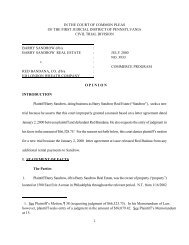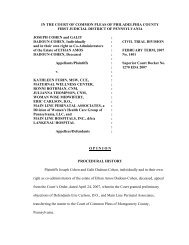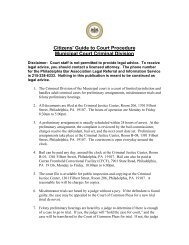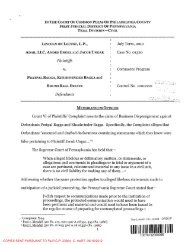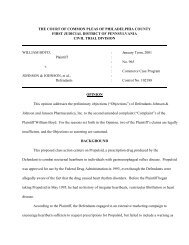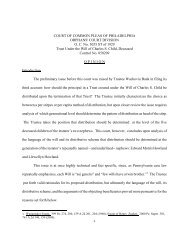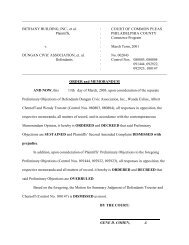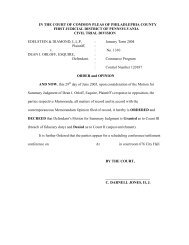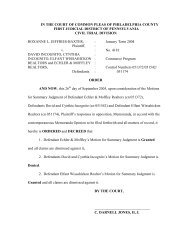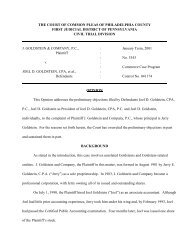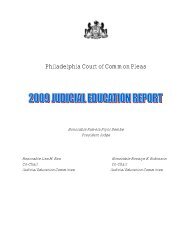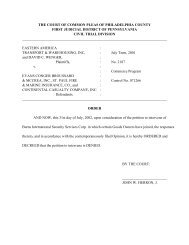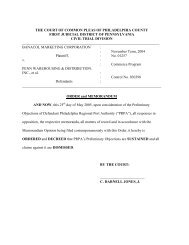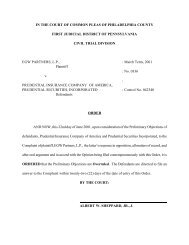OPINION - The Philadelphia Courts
OPINION - The Philadelphia Courts
OPINION - The Philadelphia Courts
You also want an ePaper? Increase the reach of your titles
YUMPU automatically turns print PDFs into web optimized ePapers that Google loves.
appellees’ Motion to Determine Preliminary Objections was sent by Motions Court to the<br />
trial judge without a response to the Motion to Determine Preliminary Objections and<br />
with the notation “uncontested.” <strong>The</strong> Court then entered an order on October 3, 2005,<br />
which sustained appellees’ preliminary objections as “uncontested” and dismissed<br />
appellants’ counterclaims with prejudice.<br />
On November 2, 2005, appellants filed a Motion for Reconsideration seeking<br />
reconsideration of the Court’s Order dated October 3, 2005, and docketed in October 4,<br />
2005. <strong>The</strong> Motion for Reconsideration was assigned to the trial judge on November 4,<br />
2005. <strong>The</strong> Court had thirty (30) days from the date of entry of the Order to act upon the<br />
Motion for Reconsideration. 2 <strong>The</strong> thirty-day period expired on November 3, 2005.<br />
Since the Court did not receive the Motion for Reconsideration until November 4, 2005,<br />
it was without jurisdiction to act upon the Motion for Reconsideration. <strong>The</strong>refore, the<br />
Court dismissed appellants’ Motion for Reconsideration. Appellants timely filed their<br />
notice of appeal.<br />
Discussion<br />
Appellants argue that the Court erred in sustaining appellees’ preliminary<br />
objections because they “filed a timely response to [appellees’] Preliminary Objections.”<br />
See Appellants’ 1925(b) Statement of Matter Complained of, 1. However, appellants<br />
are confusing an “answer to preliminary objections” with a “response to a motion to<br />
2 See Schoff v. Richter, 386 Pa. Super. 289, 291, 562 A.2d 912, 913 (1989) (“<strong>The</strong> trial court is permitted to<br />
grant reconsideration only if such action is taken during the applicable appeal period. An order granting<br />
reconsideration will only be effective if it is made and entered on the docket before expiration of the<br />
applicable appeal period, 30 days from the entry of the order which is the subject of the reconsideration<br />
motion, and if it states that it is expressly granting reconsideration.”); Commonwealth v. Moir, 2000 Pa.<br />
Super 403, *P4, 766 A.2d 1253, 1254 (2000) (“Failure to expressly grant reconsideration within the time<br />
set by the rules for filing an appeal will cause the trial court to lose its power to act on the application for<br />
reconsideration.”); See also Pa. R.A.P. 1701 (“Effect of Appeal Generally”) and its comment.<br />
2



